John Hurrell – 9 June, 2015
The theatrical manner of Noble's presentation implies satire, even though this seems unintended. Whilst she is striving for poignancy by consciously imagining a hypothetical museum display for extinct insects, the postures of the dead creatures look like pointedly humorous caricatures of human stereotypes. It is hard to imagine that Noble is thinking of bees and only bees - because to limit them to entomological portraits clearly contradicts the way they are presented, and its obvious associations.
Electron microscopes, those extraordinary devices that provide photographs of insects, spiders or small plants so enlarged that we are thoroughly immersed in their world of massive compound eyes and treelike spiky legs and mandibles, have been around for over eighty years now. The new photographs by Anne Noble, while they use that technology, are not so extreme in terms of scale. They enlarge, but yet they are calculatedly restrained. We see astonishing detail within the body parts of dead bees, but yet there is also a theatricality where the viewer’s own fantasies of being immersed in an alien world are kept in check through allusion. Lifeless bee bodies and performing human bodies are constantly being compared, invariably paralleling these dramatically posed corpses with the gestural actions of our own kind: solo singers, comedians, strippers and actors on small spotlit, circular stages.
As a keeper of hives and apiary enthusiast who is concerned about the catastrophic effects of bee diseases, parasites and insecticides, Noble is actively waving the flag for these hardworking little honeymakers. She has dusted their small furry bodies with gold powder so that the microscope can describe their anatomical detail with maximum acuity. However, through her control of lighting and props, Noble is also making use of the pathetic fallacy and anthropomorphism, where human emotions are ascribed to nonhuman life forms or inanimate objects.
This is a complex and fascinating subject, for who would deny animals have emotions, but are they similar to our own? Are our feelings akin to those of social insects in particular, where there seems to be a collective consciousness, and if the insects are solitary and not communal, are they instead like mindless robots that feel no pain, behaving reflexively as if programmed - in essence, like machines?
The theatrical manner of Noble’s presentation implies satire, even though this seems unintended. Whilst she is striving for poignancy by consciously imagining a hypothetical museum display for extinct insects, the postures of the dead creatures look like pointedly humorous caricatures of human stereotypes. It is hard to imagine that Noble is thinking of bees and only bees - because to limit them to entomological portraits clearly contradicts the way they are presented, and its obvious associations.
Nevertheless, these images have such wonderful detail that the strange nightclub ambience soon gets forgotten. One shot of a pile of broken drone wings makes these discarded appendages look like glowing (but fragmented) autumn leaves or translucent sycamore seeds, some with gorgeous gossamer patterns. Other images of hairy bee heads look monstrously menacing with their huge dark eyes and various hinged palp and mandible mouth parts.
It is more than just their detail that grips you; it is their vast textural complexity: the unending glowing patterns, forests of toustled cilia, lines of curved scales and abdominal plates, various knobby protuberances; they all enthrall. This exceptionally engrossing exhibition rewards, despite (or maybe even because of) its unintendedly amusing, possibly hammy, cabaret atmosphere.
John Hurrell
Recent Comments
elaine Smith
Whether it is Anne Nobler in the mind to suffer the slings and arrows of outrageous fortune...
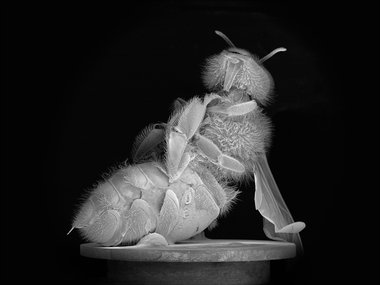
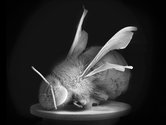
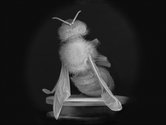
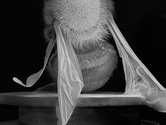
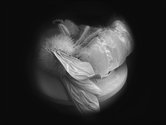
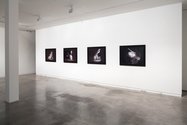
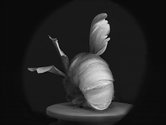
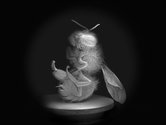
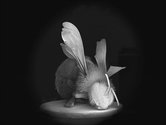
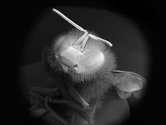
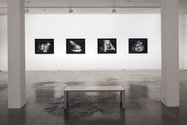
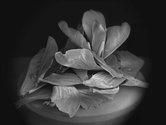
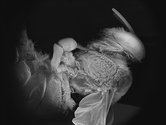
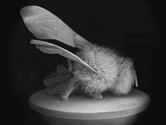
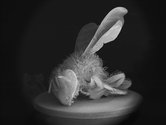
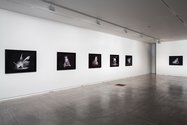
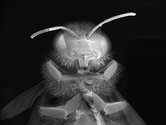
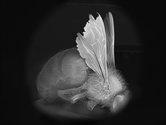
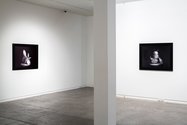
 Advertising in this column
Advertising in this column Two Rooms presents a program of residencies and projects
Two Rooms presents a program of residencies and projects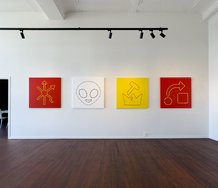
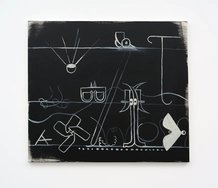
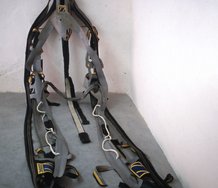
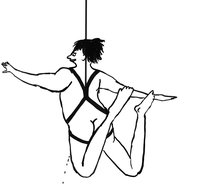
This Discussion has 1 comment.
Comment
elaine Smith, 11:11 p.m. 11 June, 2015 #
Whether it is Anne Nobler in the mind to suffer the slings and arrows of outrageous fortune...
Participate
Register to Participate.
Sign in
Sign in to an existing account.